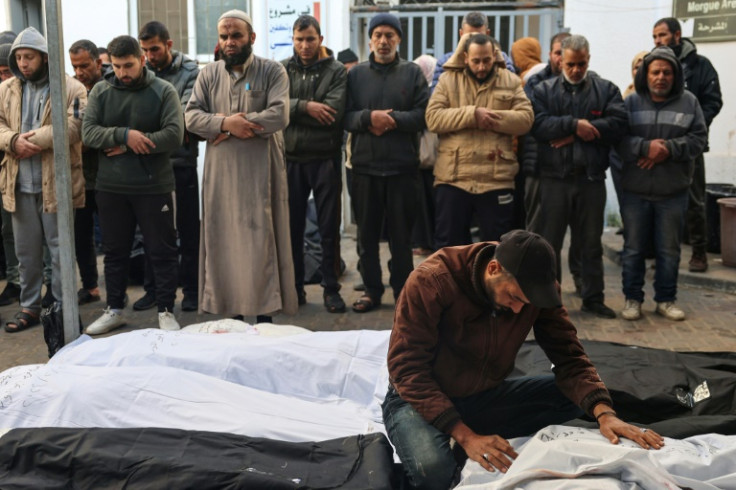Gaza Man's Last Phone Call Before Bomb Kills His Wife, Daughters, And Over 100 Relatives
Ahmad al Ghuferi lost his wife, daughters and 103 relatives in an Israeli airstrike on his family home in Gaza City.

"She knew she would die", said Ahmad al Ghuferi after his wife, daughters and 103 relatives were killed in an Israeli airstrike on their family home in Gaza City.
When Hamas launched its unprecedented attack on Israel last year, which saw around 1,200 civilians killed and more than 240 people captured by the proscribed terror group, Ahmad was working on a construction site in Tel Aviv, Israel.
After Israel officially declared war on Gaza, Ahmad was unable to return to the Gaza Strip, where he lived with his wife and three young daughters.
Israel's military blockade also left Ahmad separated from his family and stuck in the town of Jericho, located 50 miles away from Gaza and in the Israel-occupied West Bank.
When telephone connection would allow it, Ahmad told reporters that he spoke to his family at the same time each day, checking in on their safety and asking about the whereabouts of his relatives.
Since October 7, Israel's relentless bombardment of Gaza has killed almost 30,000 civilians and left around 70,000 people wounded.
Out of Gaza's original 2.2 million population, a huge 85 per cent have been forcibly displaced amid Israel's military operations.
On the evening of 8 December, Ahmad was on the phone to his wife, Shireen, when she was killed in an airstrike.
Speaking of his wife, he told the BBC: "She knew she would die."
Ahmad went on to explain: "She told me to forgive her for anything bad she might ever have done to me. I told her there was no need to say that. And that was the last call between us."
Ahmad's three young daughters, Tala, Lana and Najla, were also killed in the attack, which struck his uncles house in Gaza City.
"My daughters are little birds to me," he said, still speaking of his daughters in present tense.
"I feel like I'm in a dream. I still can't believe what's happened to us," Ahmad added.
Still trying to come to terms with the dreadful loss of his nuclear family, Ahmad also said that he has removed pictures of his daughters and his wife from his phone and laptop wallpaper screens.
With tears rolling down his face, Ahmad also told reporters that his mother, four of his brothers, dozens of aunts, uncles and cousins, were also killed in the strike.
The Israeli airstrike took 103 of his relatives, including his brothers' extended families, Ahmad explained.
After a missile had struck the entrance to their family home, his wife and three daughters "hurried out and went to my uncles house nearby".
Piecing the story together, Ahmad said: "Fifteen minutes later, a fighter jet hit that house."
The house was located in the Zeitoun neighbourhood in Gaza City, just minutes away from the Sahaba Medical Centre.
Hamid al Ghuferi, one of Ahmad's relatives, also told reporters that the only survivors in the neighbourhood were those who had avoided the strike by running up the hill.
"110 people from the Ghuferi family were there - our children and relatives... All but a handful of them were killed," Hamid said.
"It was a fire-belt," he explained, going on to note: "There were strikes on the four houses next to ours. They were hitting a house every 10 minutes," he explained."
Survivors were digging bodies out of the rubble until the early hours of the morning, despite airplanes hovering in the sky and quadcopters continuing to strike the area.
Survivors of the assault have since reported that the eldest victim was a 98-year-old grandmother.
The youngest victim was a new-born baby, born just 9 days earlier.
© Copyright IBTimes 2025. All rights reserved.






















